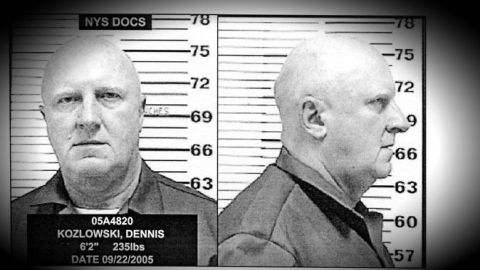Dennis Kozlowski: Poster Child or Whipping Boy?

Enron. WorldCom. Tyco. These large companies all imploded in spectacular fashion in the early 2000s, and their names are often lumped together as symbols of an era wrought with greed and corporate corruption.
Dennis Kozlowski, the founder and former CEO of Tyco, is often signaled out as a poster child for corporate excess. The details of his case, after all, made for wonderful tabloid fodder. Tyco funds were used to pay, at least in part, for a $6,000 shower curtain as well as a $2 million “Roman Orgy” themed birthday party for Kozlowski’s wife in Sardinia. Kozlowski was sentenced to 8.33 to 25 years in state prison in 2005 and is scheduled to be paroled today.
Kozlowski may be out of prison now, but can his reputation be rehabilitated? A new book by Catherine Neal, an associate professor at Northern Kentucky University, examines the man, and his legal case, in a new light. Neal argues that the sensational aspects of Kozlowski’s case obscure the more complicated truth about the man and his actions.
After having spent two and a half years researching the Tyco corporate scandal, Neal scrutinizes the actions of Tyco’s board, the DA’s office, as well as the media, and concludes that Kozlowski, along with Tyco CFO Mark Swartz, never should have been charged, convicted, or incarcerated. She tells Big Think:
I don’t see any evidence that they committed grand larceny, that they had any criminal intent…It was post-Enron and prosecutors and the public were angry with corporations and Kozlowski and Schwartz were some of the highest-paid executives in the world, so they were easy targets…A lot of the evidence presented during the trials was of how they spent their money, and they spent a lot of money. But spending money is not a crime. Buying big homes is not a crime. Throwing an expensive birthday party is not a crime. But in the courtroom that evidence was presented as if being wealthy meant you were doing something wrong.
A number of critics have faulted Neal for being overly forgiving of Kozlowski’s conduct. Andrew Hill, for one, accuses Neal of whitewashing, arguing that “she points the finger at almost everyone other than Kozlowski.”
However, according to Neal, if Kozlowski was guilty of anything it was making poor business decisions. “The thing that he did that I find most egregious,” Neal says, “is that he was not a good steward of corporate assets, of Tyco’s assets. I think that he was fast and loose with spending the corporation’s money. I think he overpaid some employees, or maybe all the employees in Tyco corporate operations. I think that he allowed policies that were not good for the corporation to exist.”
These bad decisions left Kozlowski vulnerable, Neal says. “And when he needed to defend himself, when criminal charges were alleged, he couldn’t because of all the things he didn’t do over the years to protect himself and to protect the company, to protect the shareholders.”
Neal says that Kozlowski’s experience and the Tyco corporate scandal is something that every person who is or aspires to be a corporate leader should take a close look at. After all, it was something that shouldn’t of happened. And yet, Neal says, “looking at Kozlowski, if it could happen to him I truly believe it could happen to anyone.”
In the video below, Neal walks us through Kozlowski’s past, and ponders what his future might bring.
Watch the video here:
Image courtesy of Shutterstock




